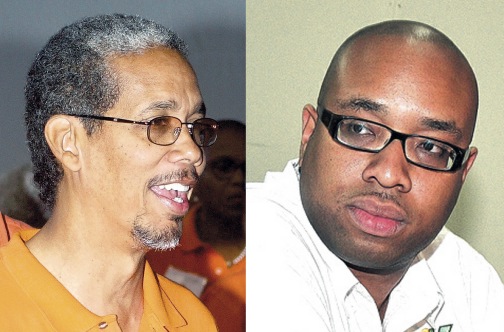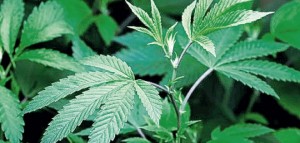Paul Burke and Delano Seiveright—
Jamaica’s first ganja growers association has begun to take shape, but potential members are being advised not to start cultivation of the weed, until the legal green light has been given.
The backers of the Ganja Future Growers and Producers Association have proposed that, as a condition of membership, interested parties sign a declaration that “they will not take any part, directly or indirectly, in the growing/cultivation of ganja until there is a legal and regulated framework for the growing of ganja”.
The association, which was launched on January 18, is an initiative of the Cannabis Commercial and Medicinal Task Force, the Ganja Law Reform Coalition and the National Alliance for the Legalisation of Ganja, spearheaded by Paul Burke, Delano Seiveright and Paul Chang, with the recent addition of University of the West Indies Principal Professor Archibald McDonald.
The reason for the no-grow proposal formulated by the National Alliance for the Legalisation of Ganja was not immediately clear, but there were suggestions yesterday that several parliamentarians on both sides of the House who support decriminalisation or legalisation of ganja, could be in conflict with the law while it remains on the books.
Jamaica Observer sources also speculated that growers had stepped up their activities as the hype intensifies and in anticipation of ganja being decriminalised.
The National Alliance has also proposed that small ganja farmers, or traditional cultivators as they are being called, get special protection at the outset of establishment of a formal cannabis industry in Jamaica, after fears that big growers could sweep them aside.
“For the first three years of a regulated industry, licences should only be given to plots of one acre or less,” the Alliance suggested.
Additionally, “home growers’ licences for medicinal or religious purposes (should) be given at nominal prices for registered property owners to seek licences for up to a maximum of 10 plants to be grown within the precincts of their homes in a fenced area”.
It further proposed that: “After the first three years of a regulated industry, that licences be granted up to 15 acres, with the value of licences increasing 150 per cent for each acre over five acres and to a maximum of 15 acres, or alternatively, the license fee should be doubled for each acre over five up to 10 acres and tripled for each acre from 10 to 15 acres, specifically to give smaller farmers a more affordable situation.
“Persons with export licences (should) engage their own producers/growers who are licensed, both parties privately negotiating their own terms and conditions of sale and purchase.”
The ganja lobby also suggests that, for the first three years of a regulated industry, the Government of Jamaica, through a designated agency, “be the sole exporter of vegetative cannabis to entities/persons with export licences, who would have engaged their own suppliers/growers, who in turn would carry it to the state agency to be inspected, packaged and shipped directly to the exporter, with the Government taking a cess”.
“The State (should) significantly increase the penalties for all illegal exportation and persons found with compressed ganja so as not to allow this illegal side of the industry to contaminate the tremendous potential of a legal and regulated cannabis industry,” the Alliance said.
Meanwhile, the Jamaican lobby is impatiently watching the rapid development of the United States marijuana industry, having estimated that a local ganja industry could earn billions of dollars. The two latest states to jump on the ganja band wagon are Hawaii and New Mexico, which are seeking to reform their laws against the weed.
Wondering out loud “what exactly is Jamaica waiting for”, Seiveright said that as cashier machines in the US get noticeably busier, politicians there are changing their tune.
“Dispensaries are reporting US$20,000 to $40,000 of sale per day. Their only issue is running out of product. None of them can stay open every day, and most are open only three to five days per week,” said Seiveright.
He cited US data showing that February’s tax collections in Colorado, the first US state to legalise ganja, would exceed US$250,000 a day, putting it on track to pull in near $100 million annually and outpacing the tax from alcoholic beverages and cigarettes. When Colorado first considered legalising recreational marijuana, it was estimated the first year’s tax take would have been $67 million.
“Beyond that, the last several days and weeks have seen a literal cascade of positive developments on the issue, so much so that even US President Barack Obama stated publicly that ganja is no more dangerous than alcohol, and pointed to the unfair state of affairs at the criminal-justice level,” he noted.
He said that following Obama’s comments, former United Nations Secretary General Kofi Annan, former Colombian President Juan Manuel Santos and Texas’ Republican Governor Rick Perry spoke strongly about the need for marijuana law reform at one of the world’s most prestigious annual gatherings of leaders, the World Economic Forum in Davos, Switzerland.
“…We have seen where yet another national NBC/Wall Street Journal poll in the US has found that a majority of Americans support legalising ganja. Meanwhile, in Florida, medical ganja will be on the November ballot, and US Attorney General Eric Holder has said that the Federal Government will allow banks to accept deposits from state-legalised businesses.
“The richest man in the US, Microsoft’s Bill Gates, stated that he voted to legalise ganja in Washington State and thinks implementation is going well so far. Even the Washington, DC, Council has given preliminary approval for decriminalisation of ganja,” said Seiveright.











